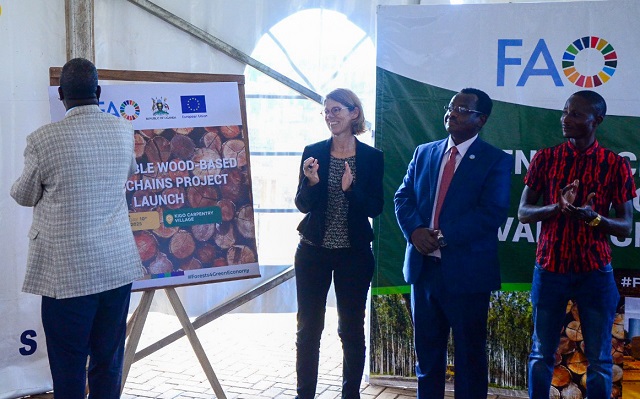
KAMPALA, UGANDA | Patricia Akankwatsa | A new project to strengthen Uganda’s sustainable wood-based value chain was launched on April 10, at Kigo Carpentry Village, with key stakeholders emphasizing the potential for economic growth, job creation, and environmental sustainability. The initiative, titled Sustainable Wood- Based Value Chains, seeks to address critical challenges in productivity, market access, and environmental sustainability while promoting economic growth and job creation. A partnership between the Food and Agriculture Organization of the United Nations (FAO) and the European Union (EU), seeks to enhance productivity, improve processing techniques, and expand market access for local wood-based businesses.
Abebe Haile Gabriel, FAO’s Assistant Director-General and Regional Representative for Africa, delivered a compelling address, emphasizing the necessity of building profitable and scalable businesses within Uganda’s wood sector. He articulated a clear vision where local enterprises evolve beyond dependency on external aid, instead becoming engines of economic growth.
“The ultimate goal is to create businesses that are not just surviving but thriving enterprises that generate profits, employ more people, pay better wages, and reinvest in expansion,” Haile Gabriel declared.
He praised Uganda’s political leadership, particularly President Yoweri Museveni, for championing policies that support local industries. However, he also issued a gentle challenge, urging stricter enforcement of procurement policies that favour Ugandan-made products.
“Government should incentivize local sourcing through budgetary mechanisms rewarding sectors that buy Ugandan timber, furniture, and other wood products. This isn’t about policing businesses; it’s about creating a system where buying local becomes the smartest economic choice,” he explained.
The project recognizes that Uganda’s wood industry cannot flourish without addressing the country’s alarming deforestation rates.
Uganda’s forests face significant threats from encroachment, deforestation, illegal timber logging, and forest degradation. Forested land has been reduced from nearly a quarter of the country’s total area in 1990 to just 13% in 2017. The project will address these challenges by promoting better practices and more efficient processing facilities to enhance the quality and value of planted forests.
Haile Gabriel highlighted the paradox facing many African nations: forests are cleared for agriculture and timber, yet without reforestation, the very resource that fuels the industry will vanish.
“We cannot talk about a sustainable wood industry without talking about sustainable forests. If we cut without replanting, we are sawing off the branch we sit on,” he cautioned. The initiative will integrate large-scale reforestation efforts, ensuring that wood production does not come at the expense of Uganda’s natural ecosystems.
The project also aims to tackle several key challenges identified within Uganda’s wood industry.
Majid Kigozi, General Secretary at Kigo Carpentry Village Association detailed the difficulties faced by local artisans, including the need for advanced machinery to improve quality and meet client deadlines, the high cost of electricity due to outdated equipment, issues with improperly dried timber affecting product quality, and a lack of essential safety equipment and gear.
“We are fighting against poverty that we want to eliminate through carpentry,” Kigozi said, expressing hope that the project would address these urgent needs.
Sanne Willems, EU Team Leader for Green Transition and Private Sector, described the project as a “win-win situation” benefiting both local communities through economic opportunities and the environment through sustainable forestry.
The initiative will invest in wood processing, provide skills training, explore export and local markets, and crucially, look into alternative financing mechanisms beyond traditional grants.
“We are encouraging all key stakeholders, particularly in the financial sector, to explore alternative financing mechanisms. There are impact investors, green bonds, and carbon financing options available that can help bridge the gap between available financing and the needs of the private sector,” she explained.
She linked the Ugandan project to the EU’s broader Global Gateway strategy, which aims to mobilize €300 billion globally by 2027 for sustainable investments.
The Project Manager Leonidas Hitimana outlined the project’s core activities over the next four years. These include assessing available wood resources, supporting the certification of plantations, providing training in efficient wood harvesting and processing techniques to reduce waste, promoting industry standards for timber and furniture, upgrading machinery, and linking cooperatives and SMEs with financial institutions to improve access to loans and resources.
Silver Ssewanyana, representing the Permanent Secretary at the Ministry of Trade, industry and cooperatives stated that the project aligns directly with Uganda’s National Development Plan 4 (NDPIV) goal of “sustainable industrialization for inclusive growth, employment, and wealth creation.”
He highlighted the government’s interest in promoting value addition to meet local demand and reduce dependency on imports, referencing the Forest Partnership Memorandum of Understanding signed between Uganda and the EU in 2022.
“We recognize and appreciate the initial progress made by FAO, one of the Forest Partnership’s implementing partners, in addressing the wood industry’s difficulties. We remain optimistic about the continued support from the EU and other partners for Uganda’s forest sector initiatives. Specifically, we look forward to a fruitful partnership with FAO focused on achieving better quality wood products and advancing carpentry skills.”
The launch also served as an opportunity to thank key partners and individuals. Both FAO and government representatives expressed deep gratitude to the European Union for its consistent support.
 The Independent Uganda: You get the Truth we Pay the Price
The Independent Uganda: You get the Truth we Pay the Price



